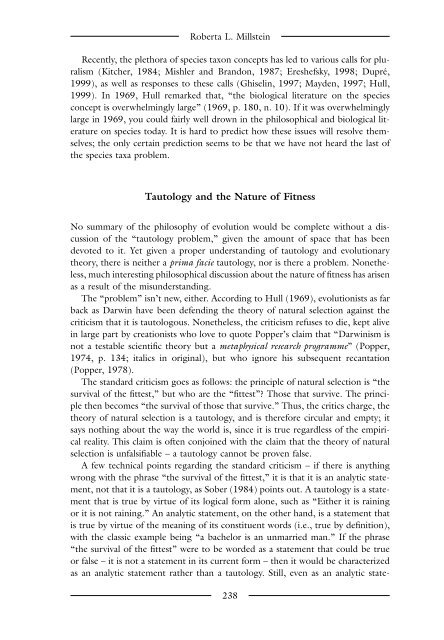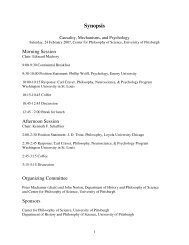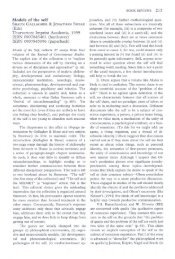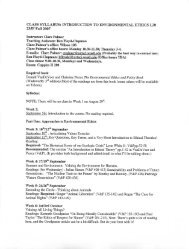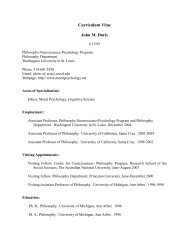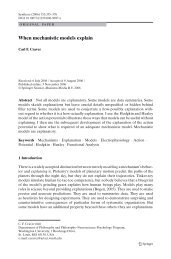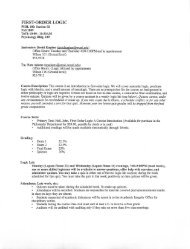The Blackwell Guide to the Philosophy of Science - The Department ...
The Blackwell Guide to the Philosophy of Science - The Department ...
The Blackwell Guide to the Philosophy of Science - The Department ...
You also want an ePaper? Increase the reach of your titles
YUMPU automatically turns print PDFs into web optimized ePapers that Google loves.
Roberta L. Millstein<br />
Recently, <strong>the</strong> plethora <strong>of</strong> species taxon concepts has led <strong>to</strong> various calls for pluralism<br />
(Kitcher, 1984; Mishler and Brandon, 1987; Ereshefsky, 1998; Dupré,<br />
1999), as well as responses <strong>to</strong> <strong>the</strong>se calls (Ghiselin, 1997; Mayden, 1997; Hull,<br />
1999). In 1969, Hull remarked that, “<strong>the</strong> biological literature on <strong>the</strong> species<br />
concept is overwhelmingly large” (1969, p. 180, n. 10). If it was overwhelmingly<br />
large in 1969, you could fairly well drown in <strong>the</strong> philosophical and biological literature<br />
on species <strong>to</strong>day. It is hard <strong>to</strong> predict how <strong>the</strong>se issues will resolve <strong>the</strong>mselves;<br />
<strong>the</strong> only certain prediction seems <strong>to</strong> be that we have not heard <strong>the</strong> last <strong>of</strong><br />
<strong>the</strong> species taxa problem.<br />
Tau<strong>to</strong>logy and <strong>the</strong> Nature <strong>of</strong> Fitness<br />
No summary <strong>of</strong> <strong>the</strong> philosophy <strong>of</strong> evolution would be complete without a discussion<br />
<strong>of</strong> <strong>the</strong> “tau<strong>to</strong>logy problem,” given <strong>the</strong> amount <strong>of</strong> space that has been<br />
devoted <strong>to</strong> it. Yet given a proper understanding <strong>of</strong> tau<strong>to</strong>logy and evolutionary<br />
<strong>the</strong>ory, <strong>the</strong>re is nei<strong>the</strong>r a prima facie tau<strong>to</strong>logy, nor is <strong>the</strong>re a problem. None<strong>the</strong>less,<br />
much interesting philosophical discussion about <strong>the</strong> nature <strong>of</strong> fitness has arisen<br />
as a result <strong>of</strong> <strong>the</strong> misunderstanding.<br />
<strong>The</strong> “problem” isn’t new, ei<strong>the</strong>r. According <strong>to</strong> Hull (1969), evolutionists as far<br />
back as Darwin have been defending <strong>the</strong> <strong>the</strong>ory <strong>of</strong> natural selection against <strong>the</strong><br />
criticism that it is tau<strong>to</strong>logous. None<strong>the</strong>less, <strong>the</strong> criticism refuses <strong>to</strong> die, kept alive<br />
in large part by creationists who love <strong>to</strong> quote Popper’s claim that “Darwinism is<br />
not a testable scientific <strong>the</strong>ory but a metaphysical research programme” (Popper,<br />
1974, p. 134; italics in original), but who ignore his subsequent recantation<br />
(Popper, 1978).<br />
<strong>The</strong> standard criticism goes as follows: <strong>the</strong> principle <strong>of</strong> natural selection is “<strong>the</strong><br />
survival <strong>of</strong> <strong>the</strong> fittest,” but who are <strong>the</strong> “fittest”? Those that survive. <strong>The</strong> principle<br />
<strong>the</strong>n becomes “<strong>the</strong> survival <strong>of</strong> those that survive.” Thus, <strong>the</strong> critics charge, <strong>the</strong><br />
<strong>the</strong>ory <strong>of</strong> natural selection is a tau<strong>to</strong>logy, and is <strong>the</strong>refore circular and empty; it<br />
says nothing about <strong>the</strong> way <strong>the</strong> world is, since it is true regardless <strong>of</strong> <strong>the</strong> empirical<br />
reality. This claim is <strong>of</strong>ten conjoined with <strong>the</strong> claim that <strong>the</strong> <strong>the</strong>ory <strong>of</strong> natural<br />
selection is unfalsifiable – a tau<strong>to</strong>logy cannot be proven false.<br />
A few technical points regarding <strong>the</strong> standard criticism – if <strong>the</strong>re is anything<br />
wrong with <strong>the</strong> phrase “<strong>the</strong> survival <strong>of</strong> <strong>the</strong> fittest,” it is that it is an analytic statement,<br />
not that it is a tau<strong>to</strong>logy, as Sober (1984) points out. A tau<strong>to</strong>logy is a statement<br />
that is true by virtue <strong>of</strong> its logical form alone, such as “Ei<strong>the</strong>r it is raining<br />
or it is not raining.” An analytic statement, on <strong>the</strong> o<strong>the</strong>r hand, is a statement that<br />
is true by virtue <strong>of</strong> <strong>the</strong> meaning <strong>of</strong> its constituent words (i.e., true by definition),<br />
with <strong>the</strong> classic example being “a bachelor is an unmarried man.” If <strong>the</strong> phrase<br />
“<strong>the</strong> survival <strong>of</strong> <strong>the</strong> fittest” were <strong>to</strong> be worded as a statement that could be true<br />
or false – it is not a statement in its current form – <strong>the</strong>n it would be characterized<br />
as an analytic statement ra<strong>the</strong>r than a tau<strong>to</strong>logy. Still, even as an analytic state-<br />
238


